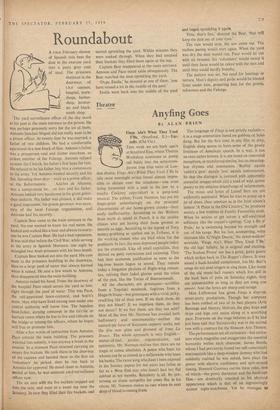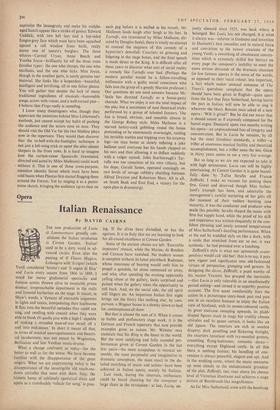Theatre — —
Anyfing Goes
By ALAN BRIEN
Fings Ain't What They Used T'Be. (Stratford, E.)—Tar- tuffe. (Old Vic.) Tuts week we are back again at Stratford East, where Theatre Workshop continues to pump red biddy into the semi-trans- parent true blue veins of Lon- don drama. Fings Ain't What They Used T'Be (a title most overnight critics found almost impos- sible to dictate over the telephone—one even being threatened with a sock in the jaw by a touchy Cockney copy-taker) is a gang-land musical. The author, Frank Norman, has put his finger-print unhesitatingly on the principal characteristic of our home-grown crooks—their seedy ineffectuality. According to the Welfare State myth a's retold in Punch, it is the middle classes who are having their faces ground as smooth as eggs. According to the legend of Tory money-grubbing as spelled out in Tribune, it is the working classes who are bled white for the profiteers. In fact, the most depressed people today are the criminals. Like all small capitalists, they thrived on petty restrictions and rationing. They lost their economic justification as soon as the big-time boom began to sound. They remain today a forgotten phalanx of Right-wing roman- tics, reliving their faded 'glories amid the relics of the past, like the Tories of Bournemouth.
All the characters are grotesques—scribbles from a Topolski notebook, fugitives from a Hogarth frieze—but grotesques with a vivid, jerky, crackling life of their own. If we slash them, do they not bleed? If we imprison them, do they not decay? If we buy them, are they not sold? Most of the time Mr. Norman has avoided both buffoonery and sentimentality—neither the custard-pie farce of Keystone coppers' narks, nor the film noir gloss and glamour of Irma La Douce. The whole approach is very English— matter-of-fact, jocular, argumentative, and optimistic. Mr. Norman realises that there are no tragic or comic absolutes. A ponce who 'loses his whores can be as ruined as a millionaire who loses his banks. The razor king who,iiasn't been exposed in the Sunday papers for ten years has fallen as far as a West End star who hasn't had her flat robbed in ten months. Relativity is. all. By pre- serving an ironic sympathy for every flea in his circus, Mr. Norman makes us care where its next drop of blood is coming from. The language of Fings is not strictly realistic— it is a stage convention based on gobbets of Soho slang. But for the first time in any film or play, English slang seems to have some of the gaudy liveliness of. American. speech. In a way, it has an even richer texture. It is not based on concealed metaphors, or transferred similes, but on meaning- less rhymes and assonances. 'Rabbit' equals 'rabbit's paw' equals 'jaw' equals conversation. So that the dialogue is jammed with apparently surrealist images which add a kind of wild, gutter poetry to the simplest interchange of information.
The music and lyrics of Lionel' Bart are not uniformly successful. When he tries to pump up a jet of sheer, clear emotion as in the Irish whore's lament 'A Place in the Old Country,' he produces merely a few bubbles of Family Favourites slush. When he strains to get across a self-analytical soliloquy like the copper's apology 'Cop a Bit o' Pride,' he is swimming beyond his strength and out of his range. But his fast, scampering, witty choruses like `G'Night Deark,' the street-walkers' serenade, 'Fings Ain't What They Used T'Be,' the old lags' lullaby, he is original and exciting. 'The Student Ponce' too has a gutsy, gusty gaiety which strikes back to The Beggar's Opera. It may sound a back-handed compliment, but Mr. Bart's songs do not need singers to sing them. Like many of the old music-hall rousers which live still in the back bars of pubs on Saturday nights, they are indestructible as long as they are sung con amore. And the lyrics are sharp and savage.
Miss Littlewood has given Fings a slap-up, street-party production. Though her company has been robbed of two of its best players (Avis Bunnage and Murray Melvin), the play hops and skips and hips and snaps along at a scorching pace. Everyone on the stage behaves as if he had just been told that Stanislaysky was in the second row with a contract for the Moscow Arts Theatre.
The performances are all caricature—but carica- ture which magnifies and exaggerates the essential humanity within each character. James Booth, whom I had previously found too self-consciously marionettish like a shop-window dummy who had suddenly realised he was naked, here plays the ponce with electric confidence and split-second timing. Howard Goorney carries three roles, two of which—the pansy decorator and the bankrupt Hon.—are drastically unsuited to his physical appearance which is that of an ingratiatingly sinister night-watchman. Yet he manages to capitalise the incongruity and make his middle- aged hunch appear like a stroke of genius. Edward Caddick, with two left feet and a lop-sided fungus-grey face which must have been squashed against a cell window from birth, really seems one of nature's burglars. The three whores—Carmel Cryan, Anne Beach and Yootha Joyce—brilliantly hit off the three most familiar types: the one who slumps, the one who oscillates, and the one who ticks. Miss Joyce, though in the smallest parts, is surely genuine star material. She looks like a leopardess—beautiful, intelligent and terrifying, all in one feline glance. You will gather that despite the lack of many traditional ingredients of musicals—hummable songs, actors with voices, and a well-turned plot— I believe that Fings really is somefing.
I know many theatregoers who, though they appreciate the intentions behind Miss Littlewood's methods, just cannot accept her habit of pushing the audience and the actors nose to nose. They should visit the Old Vic for the two Moliere plays now in the repertoire. They would then discover that the to-hell-with-the-footlights technique is not just a left-wing trick to upset the after-dinner sleepers in the front rows. It is hard to•imagine how the curtain-raiser Sganarelle (translated, directed and acted by Miles Malleson) could work without it. This is one of those cross-purpose, mistaken identity farces which must have been cold beans when Plautus first started flogging them around the Forum. Yet by staging it as a panto- mime sketch, bringing the audience up-to-date on each gag before it is stuffed in his mouth, Mr. Malleson lands laugh after laugh at his feet. In Tartuffe, too (translated by Miles Malleson, dir- ected by Douglas Seale), there is wisely no attempt to conceal the staginess of this comedy of a hypocrite's downfall. Courtiers sit grinning and fidgeting in the stage boxes, and the final speech is made direct to the King. It is difficult after all these years to discover what sort of social reality a comedy like Tartuffe ever had. (Perhaps the modern parallel would be a fellow-travelling millionaire with a guilty social conscience who falls into the grasp of a greedy Marxist professor.) Our questions do not need answers because Mr. *Seale has directed Tartuffe as a house-party charade. What we enjoy is not the total impact of the play but a succession of neat theatrical tricks performed by a group of talented funsters. The fun is broad, obvious, and unsubtle almost in the George Robey style. Miles Malleson is a starved turkey-cock gobbling round the house pretending to be enormously overweight, rattling his invisible wattles and tripping over his scrawny legs—no man better at slowly inflating a joke balloon until everyone has his hands clapped to his ears and then allowing it to deflate suddenly with a vulgar squeak. John Scarborough's Tar- tuffe was too conscious of his own villainy, but his dupe, Gerald James, operated cunningly on two levels of savage rabbitry shuttling between Alfred Drayton and Robertson Hare. All in all, on South Bank and East End, a victory for the open plan in dramaturgy.



































 Previous page
Previous page